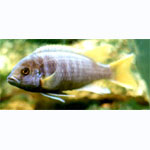
Scientific Name: Pseudotropheus acei
Origin: Lake Malawi
Family: Cichlidae
Other Names: Gephyrochromis acei, Pseudotropheus sp. Acei (Msuli)
Technical Info
Temperature: 23 - 28 ℃
pH: 7.6 - 8.6
GH: 8 - 12
Max size: 10 cm
Min Tank size: 150 Ltr
Position in Aqua: No special swimming level
Description
This describes the overall demeanor of a cichlid toward other tankmates that are of a different species. Consider that there is variability in temperament due to various factors, including aquarium size, tankmates of similar appearance, stocking levels, and order of introduction. There may even be some variability among individual specimens.
Food
Many cichlids specialize in eating one type of food; notwithstanding, some of these specialized feeders are flexible and can be opportunistic feeders.
Breeding
Pseudotropheus acei is an ovophile mouth brooder , which means that they will incubate and hatch the eggs in her buchal pouch, and then continue to hold the fry until the yolk sacs have been consumed. A typical holding period for this Cichlid is three weeks, and the female will not eat during this time. Females can have around 50 fry per spawning, although this can greatly vary depending on her size and experience. Once the eggs are done incubating the female spits them out and they are left to fend for themselves.
Compatible with
Not especially aggressive for a mbuna. It should not be kept with large mbuna or other boisterous fish but does well with the moderately aggressive species. Other possible tankmates include Aulonocara, Copadichromis and other quieter Malawi cichlids. Male fish are territorial but even this is not as pronounced as in most mbuna. Several males can be kept in a suitably large aquarium and each should be provided with several females.
Note
Ps. Acei feeds on algae that have grown on wood. This is a popular cichlid in the hobby because of its gentle temperament, great monomorphic colors, and its tendency to swim in the top half of the aquarium (which is unusual for mbuna).





